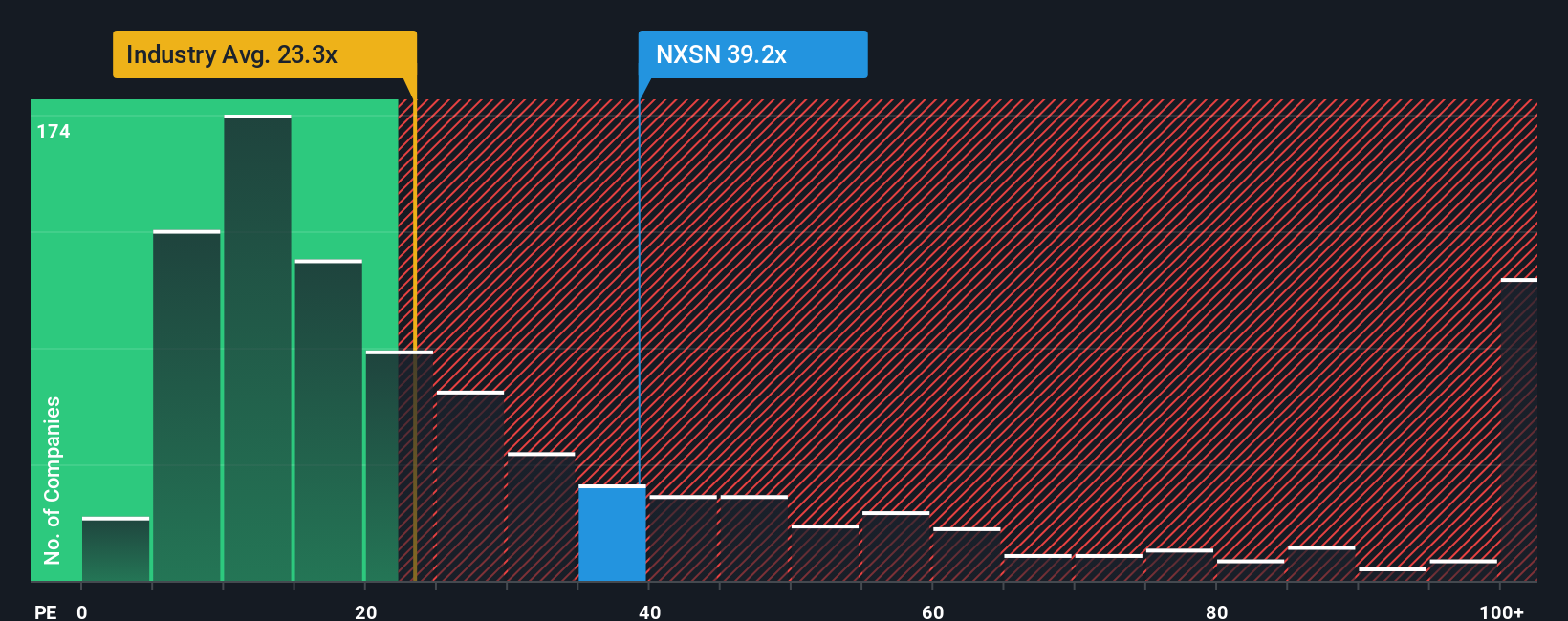- Israel
- /
- Electronic Equipment and Components
- /
- TASE:NXSN
Why Investors Shouldn't Be Surprised By NextVision Stabilized Systems, Ltd.'s (TLV:NXSN) 33% Share Price Surge
The NextVision Stabilized Systems, Ltd. (TLV:NXSN) share price has done very well over the last month, posting an excellent gain of 33%. The annual gain comes to 119% following the latest surge, making investors sit up and take notice.
Since its price has surged higher, NextVision Stabilized Systems may be sending very bearish signals at the moment with a price-to-earnings (or "P/E") ratio of 39.2x, since almost half of all companies in Israel have P/E ratios under 15x and even P/E's lower than 10x are not unusual. Although, it's not wise to just take the P/E at face value as there may be an explanation why it's so lofty.
With earnings growth that's exceedingly strong of late, NextVision Stabilized Systems has been doing very well. The P/E is probably high because investors think this strong earnings growth will be enough to outperform the broader market in the near future. You'd really hope so, otherwise you're paying a pretty hefty price for no particular reason.
See our latest analysis for NextVision Stabilized Systems

Does Growth Match The High P/E?
There's an inherent assumption that a company should far outperform the market for P/E ratios like NextVision Stabilized Systems' to be considered reasonable.
Taking a look back first, we see that the company grew earnings per share by an impressive 88% last year. The latest three year period has also seen an excellent 1,183% overall rise in EPS, aided by its short-term performance. Accordingly, shareholders would have probably welcomed those medium-term rates of earnings growth.
This is in contrast to the rest of the market, which is expected to grow by 9.1% over the next year, materially lower than the company's recent medium-term annualised growth rates.
In light of this, it's understandable that NextVision Stabilized Systems' P/E sits above the majority of other companies. Presumably shareholders aren't keen to offload something they believe will continue to outmanoeuvre the bourse.
What We Can Learn From NextVision Stabilized Systems' P/E?
The strong share price surge has got NextVision Stabilized Systems' P/E rushing to great heights as well. Generally, our preference is to limit the use of the price-to-earnings ratio to establishing what the market thinks about the overall health of a company.
As we suspected, our examination of NextVision Stabilized Systems revealed its three-year earnings trends are contributing to its high P/E, given they look better than current market expectations. At this stage investors feel the potential for a deterioration in earnings isn't great enough to justify a lower P/E ratio. If recent medium-term earnings trends continue, it's hard to see the share price falling strongly in the near future under these circumstances.
Before you take the next step, you should know about the 2 warning signs for NextVision Stabilized Systems (1 is potentially serious!) that we have uncovered.
You might be able to find a better investment than NextVision Stabilized Systems. If you want a selection of possible candidates, check out this free list of interesting companies that trade on a low P/E (but have proven they can grow earnings).
Valuation is complex, but we're here to simplify it.
Discover if NextVision Stabilized Systems might be undervalued or overvalued with our detailed analysis, featuring fair value estimates, potential risks, dividends, insider trades, and its financial condition.
Access Free AnalysisHave feedback on this article? Concerned about the content? Get in touch with us directly. Alternatively, email editorial-team (at) simplywallst.com.
This article by Simply Wall St is general in nature. We provide commentary based on historical data and analyst forecasts only using an unbiased methodology and our articles are not intended to be financial advice. It does not constitute a recommendation to buy or sell any stock, and does not take account of your objectives, or your financial situation. We aim to bring you long-term focused analysis driven by fundamental data. Note that our analysis may not factor in the latest price-sensitive company announcements or qualitative material. Simply Wall St has no position in any stocks mentioned.
About TASE:NXSN
NextVision Stabilized Systems
Develops, manufactures, and markets a stabilized day and night photography solution for ground and aerial vehicles in Israel and internationally.
Flawless balance sheet with high growth potential.
Similar Companies
Market Insights
Weekly Picks

Solutions by stc: 34% Upside in Saudi's Digital Transformation Leader


The AI Infrastructure Giant Grows Into Its Valuation
Recently Updated Narratives

Perdana Petroleum Berhad is a Zombie Business with a 27.34% Profit Margin and inflation adjusted revenue Business
Many trends acting at the same time


Engineered for Stability. Positioned for Growth.
Popular Narratives


MicroVision will explode future revenue by 380.37% with a vision towards success


NVDA: Expanding AI Demand Will Drive Major Data Center Investments Through 2026



